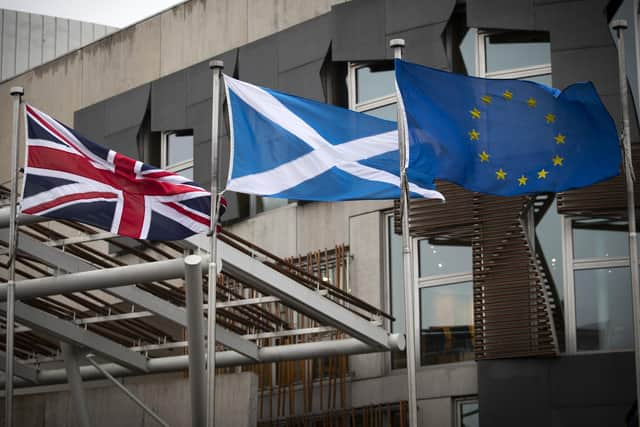Brexit pushing voters to independence as almost half of Scots think it has 'gone badly'
The poll from Savanta ComRes for The Scotsman shows that 41 per cent of Scots believe Brexit has “gone badly” so far since the United Kingdom left the European Union on December 31.
Just 16 per cent of Scots believe it has gone well, with a third (34 per cent) of the public saying it had neither gone well nor badly.
Advertisement
Hide AdAdvertisement
Hide AdThe survey interviewed 1,001 Scottish adults aged 16 and over between April 16 and 20.


Figures from the poll state that a third of voters state that Brexit has made them “more likely” to vote Yes in any second independence referendum with one in five (21 per cent) saying it would push them towards voting No.
A further 38 per cent said leaving the EU had made them “no more or less likely” to vote Yes or No in any independence referendum.
In 2016, 1,661,191 or 62 per cent of voters in Scotland backed staying in the European Union with 1,018,322 (38 per cent) voting to leave.
With public attention firmly fixed on Covid-19 and the political classes focused on the psychodrama of the Salmond Inquiry in Holyrood, the impact of Brexit has been relegated to further down news bulletins.
However, with large queues at ports and exports of goods dropping by 41 per cent overall in January according to official figures, voters are much more likely to say it has gone badly than well.
For voters who either didn’t vote or could not vote in the 2014 independence referendum, it is also a clear driver towards supporting Yes.
A total of 41 per cent of those voters said they were now more likely to vote Yes if another referendum was held, with 14 per cent stating Brexit had made them more likely to vote No.
A further 17 per cent said they did not know.
Advertisement
Hide AdAdvertisement
Hide AdBrexit has not had the same effect on 2016 No voters, with a third of them stating the divorce with the European Union had made them less likely to vote Yes.
A total of 13 per cent of 2016 Yes voters also said it had made them less likely to support independence.
This trend of Brexit pushing voters towards Yes was also evident across all age groups apart from those aged over 65 (with a net likelihood of minus eight per cent).
Around 40 per cent of 16-24 year olds (39 per cent), 25-34 year olds (42 per cent) and 35-44 year olds (42 per cent) said Brexit had made them more likely to vote Yes.
Nicola Sturgeon has framed her attempts to gain a second independence referendum around the result of the Brexit referendum in 2016, claiming the vote to leave constitutes a material change in circumstances and therefore justification for another referendum.
The SNP have also campaigned since 2016 to rejoin the EU once Scotland is independent and under the leadership of Alex Salmond claimed an independent Scotland would remain part of the EU during the 2014 referendum.
Figures from this poll suggest this is the preferred route to a new relationship with Europe post-independence but also the most divisive.
Almost half, 51 per cent, of Scots say they would support a move with 30 per cent stating they would oppose rejoining the EU.
Advertisement
Hide AdAdvertisement
Hide AdA further 13 per cent said they would neither support nor oppose and eight per cent said they didn’t know.
Conservative voters are overwhelmingly the least likely to back rejoining the EU with 70 per cent of 2016 Tory voters saying they would oppose such a move.
SNP voters were most likely to back full membership of the EU with a net support rating of +56 per cent, followed by Labour (+34 per cent) and Liberal Democrats (25 per cent).
However, joining the European Free Trade Agreement, put forward by Alex Salmond’s Alba Party as their preferred relationship with Europe, would also be backed by 43 per cent of voters.
One in five (19 per cent) state they would oppose the move, with a quarter (26 per cent) stating they would neither support nor oppose and 12 per cent stating they did not know.
Voters for all parties in 2016 were broadly supportive of a move to join EFTA, with the lowest level of support among Conservatives at a net support of +20 per cent and the highest among Liberal Democrats on a net support of +32 per cent.
Chris Hopkins, the associate director at Savanta ComRes, said perceptions of the success of Brexit improve could lead to a change in support for independence.
He said: “With Brexit being perceived to have gone badly for Scotland, it is perhaps little surprise that almost half would support an independent Scotland re-joining the EU, while almost as many would support it joining EFTA.
Advertisement
Hide AdAdvertisement
Hide Ad"Brexit has also seemed to have some impact on an increased appetite for independence, with a quarter of 2019 Labour voters saying that Brexit has increased their support for independence, while 16 per cent of 2014 No voters say the same.
"These findings tend to imply that if the perception of Brexit improves then perhaps support for independence will wane, and therefore Scottish Conservatives in particular will be keen to stress its successes, while the SNP should focus on its failings in order to continue to drive a wedge between Scots and Westminster through Brexit.”
A message from the Editor:
Thank you for reading this article. We're more reliant on your support than ever as the shift in consumer habits brought about by coronavirus impacts our advertisers.
If you haven't already, please consider supporting our trusted, fact-checked journalism by taking out a digital subscription.
Comments
Want to join the conversation? Please or to comment on this article.